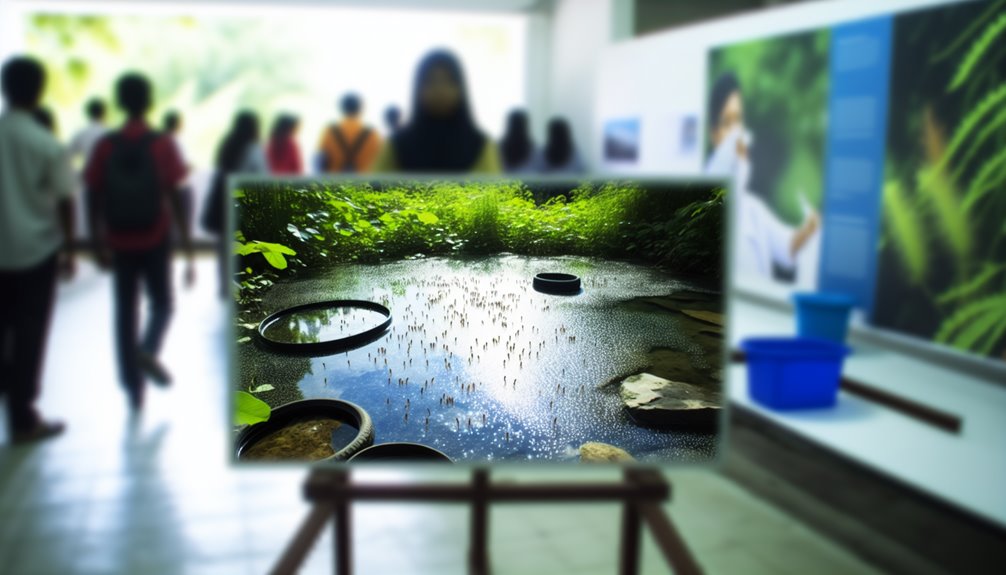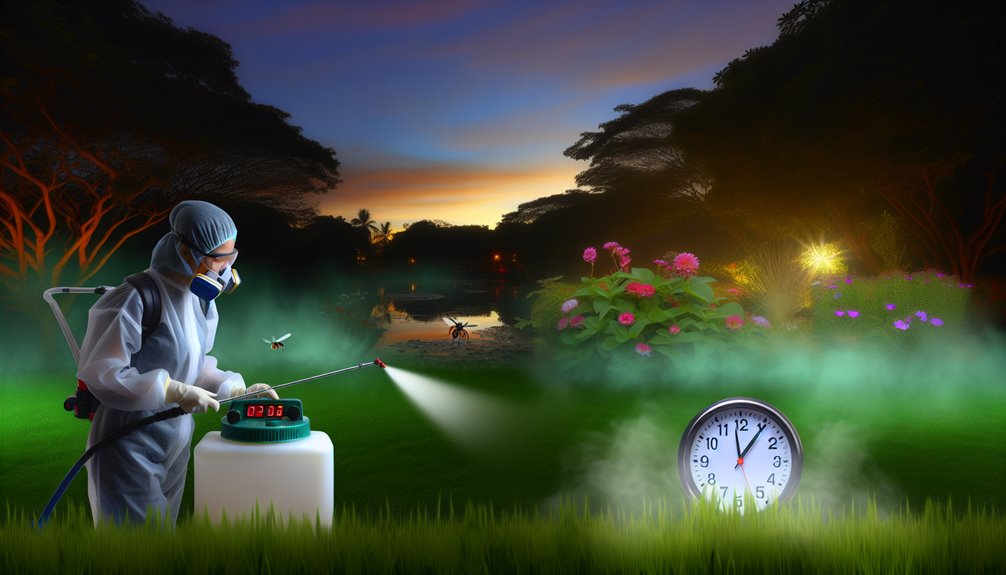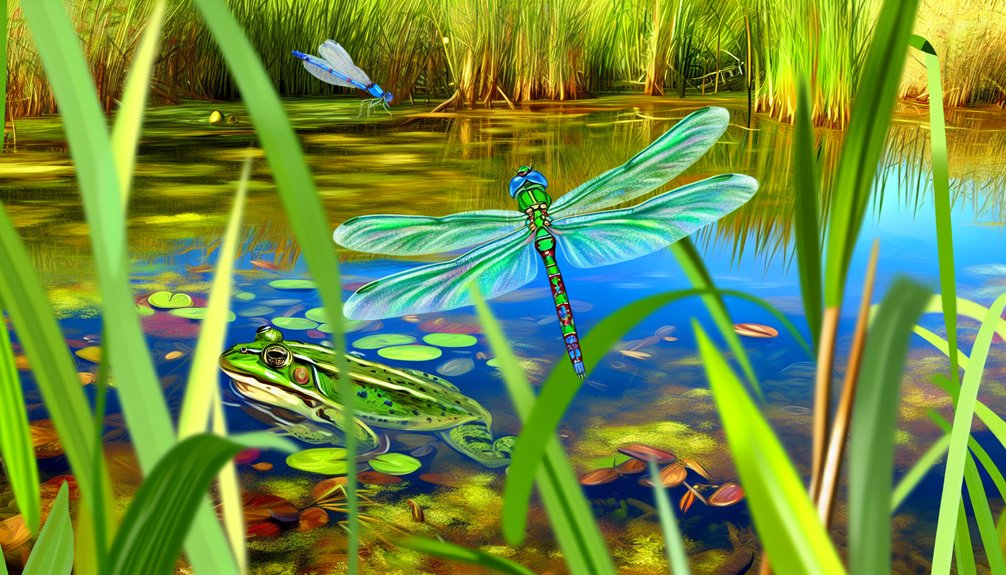You might think you know everything about mosquito control, but there are essential insights professionals have that can change your approach. Understanding the breeding habits of these pests and the significance of standing water can make a significant difference in your efforts. Timing your treatments for maximum effectiveness is another key factor. As we explore these points, you’ll discover strategies that could elevate your mosquito management game. What else could be lurking in the shadows of common knowledge?
Understanding Mosquito Breeding Habits

Understanding mosquito breeding habits is essential for effective control, as these insects thrive in specific environments.
You’ll find that stagnant water, such as ponds, marshes, and even containers, serves as ideal breeding environments. Female mosquitoes lay eggs in these sites, initiating the mosquito lifecycle. The eggs hatch into larvae, which develop into pupae before maturing into adults.
Each stage of this lifecycle relies on warm temperatures and moisture, making certain conditions more conducive to rapid population growth. By recognizing these breeding environments, you can implement targeted strategies to disrupt the lifecycle.
This proactive approach not only minimizes mosquito populations but also enhances community well-being, allowing you to serve others effectively by reducing the risk of mosquito-borne diseases.
The Importance of Eliminating Standing Water
Eliminating standing water is a critical step in controlling mosquito populations because it directly disrupts their breeding cycle. Mosquitoes lay eggs in stagnant water, creating breeding sites that can lead to explosive population growth.
By regularly inspecting your property for areas where water collects—such as clogged gutters, bird baths, and discarded containers—you can greatly reduce potential breeding sites. Even small amounts of standing water can support thousands of larvae, making vigilance essential.
If you find any stagnant water, drain it immediately or change the water frequently to prevent mosquitoes from settling. By taking these proactive measures, you not only protect your home but also contribute to the broader community’s efforts in reducing mosquito-borne diseases and enhancing public health.
Timing Is Everything: When to Treat Your Yard

Timing your yard treatments for mosquito control can greatly influence their effectiveness, especially since these pests are most active during specific seasons and times of day.
Understanding seasonal timing is essential; treatments should coincide with peak mosquito activity, typically in late spring and summer. Additionally, observe local weather patterns; rainfall can increase mosquito populations by creating more breeding sites.
Ideal treatment times are early morning or late evening, aligning with their peak activity. By targeting these specific periods, you enhance the efficacy of your control methods.
Regularly monitoring environmental conditions and adjusting your schedule can further optimize your efforts. This proactive approach not only protects your yard but also serves your community by reducing overall mosquito populations.
Effective Use of Insect Growth Regulators
While many traditional mosquito control methods focus on killing adult mosquitoes, using insect growth regulators (IGRs) offers a strategic approach that disrupts the pests’ life cycle.
IGRs work by mimicking hormones, preventing larvae from maturing into adults. For effective application, target areas where standing water accumulates, as this is where mosquito larvae thrive.
Applying IGRs during peak breeding seasons enhances their efficacy, ensuring fewer adults emerge. It’s essential to use IGRs in conjunction with other control methods for best results.
Regular monitoring and adjustments based on environmental conditions can maximize their impact. By understanding insect growth and implementing IGRs thoughtfully, you can greatly reduce mosquito populations and create a safer environment for your community.
Natural Predators: A Mosquito’s Worst Enemy

Natural predators play an essential role in managing mosquito populations, as they provide a biological control method that minimizes reliance on chemical interventions.
For instance, certain bird species, like purple martins and swallows, actively hunt adult mosquitoes, greatly reducing their numbers. Similarly, specific fish types, such as gambusia (mosquito fish), thrive on mosquito larvae in aquatic habitats.
By encouraging these natural predators in your area, you can foster a balanced ecosystem that effectively curtails mosquito reproduction. Creating habitats that attract these beneficial species not only aids in mosquito control but also promotes biodiversity.
Understanding and leveraging the role of natural predators can empower you to serve your community better by reducing mosquito populations sustainably and enhancing overall public health.
The Role of Traps and Zappers in Control
Encouraging natural predators is only one facet of an effective mosquito management strategy; employing traps and zappers offers a complementary approach that targets adult mosquitoes directly.
Understanding their role can enhance your control efforts.
- Trap Effectiveness: Traps are designed to lure and capture mosquitoes, considerably reducing their population in targeted areas.
- Zapper Maintenance: Regularly clean and replace bulbs in zappers to guarantee peak performance and longevity.
- Placement Strategy: Position traps and zappers in shaded areas where mosquitoes are likely to rest.
- Seasonal Use: Deploy these devices during peak mosquito seasons for maximum efficacy.
Professional Treatments vs. DIY Solutions
When considering mosquito control options, you’ll find yourself weighing the benefits of professional treatments against DIY solutions.
Professional treatments typically utilize advanced formulations with higher chemical efficacy, ensuring that adult mosquitoes are eliminated effectively. These treatments are administered with careful attention to treatment frequency, often scheduled monthly or seasonally for ideal results.
In contrast, DIY solutions may use readily available products, but their effectiveness can be inconsistent due to varying application techniques and environmental factors. While DIY methods can provide temporary relief, they often fall short in long-term control.
Ultimately, if you’re committed to serving your community effectively, investing in professional treatments can yield more sustainable outcomes in managing mosquito populations and safeguarding public health.
Conclusion
As the owner of Mosquito Eliminators of South MS, I truly believe that understanding mosquitoes is key to reclaiming your outdoor space. It’s not just about getting rid of them temporarily; it’s about creating a safe haven for you and your family to enjoy. I invite you to visit mosquitoeliminatorsms.com to learn more about our comprehensive approach to mosquito control or give us a call at (601) 336-2277. Together, we can make your yard a peaceful retreat, free from those pesky pests. Let’s take back your outdoor enjoyment!

